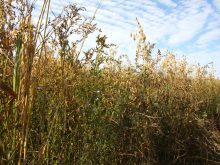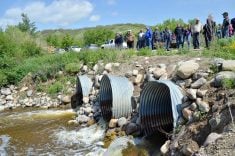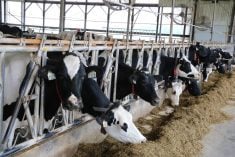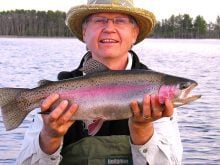Manitoba’s processing potato producers have water worries.
Specifically, they’re concerned about the number of available water licences, which allow the irrigation-reliant industry to draw from surface or groundwater.
Dan Sawatzky, manager of the Keystone Potato Producers Association, says aquifer access is “basically fully allocated,” as are the minor streams some producers use to refill reservoirs.
Read Also

Farmer mental health support extended in Manitoba
The Manitoba Farmer Wellness Program is slated for $300,000 over the next two years for its farm mental health services
Why it matters: Water access is becoming a limiting factor for the potato sector.
“There’s a little bit left, possibly, on the Assiniboine River, but we’re looking to see whether there’s any possibility to increase water licensing on some of the bodies that we currently do use,” he said.
The issue was particularly acute in 2021, when low spring runoff carried over into widespread drought. Irrigation reservoirs did not fully recharge and many rivers and streams dropped alarmingly low.
The association is awaiting results from a University of Manitoba study examining recharge in the Assiniboine Delta Aquifer. That study is entering its fifth and final year.
“The aquifer licensing was allocated back a number of years ago,” Sawatzky said. “They were very, very conservative in what they were licensing and we want a review of that to see whether there’s any possibility of increasing some outflow.”
Provincial regulations require individuals and companies to have a licence for uses over 25,000 litres a day.
Licences are “issued for a time period appropriate for the situation to a maximum of 20 years, and may be renewed upon application,” according to the Government of Manitoba website.
The potato association would like local producers to be able to supply more to the province’s major processing plants, J.R. Simplot and McCain Foods. Sawatzky noted those companies now source out-of-province spuds.
The province is aware of the University of Manitoba study, he said, adding, “they have been quite helpful as well in providing data to see that study through.
“We’ll see where that goes when it’s done and see what the province decides to do with it.”
Precious H20
There is also the matter of the province’s new water strategy, released in December 2022. Water conservation was one of its key messages, along with quality and quantity of groundwater, water infrastructure, better data collection, Indigenous participation and ecological measures.
At the time, the province emphasized the need for climate resiliency in water use and the need to adapt to swings between flood and drought.
The potato and vegetable industries were part of strategy talks. Peak of the Market CEO Pamela Kolochuk stressed the need for clarity on water rights and water availability during consultations, the Co-operator reported at the time.


















